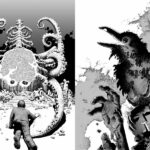Making the list of our editorial picks for the winter of 2020 was not an easy task, considering the many wonderful titles that were published, in spite of the emergence of Covid-19, an occurrence which has, nevertheless, postponed numerous publication dates and events. If there is something good that will come out of this year of grave uncertainties, it is the realization that the culture of reading will persevere in face of all obstacles.
Bearing in mind that the output relating to independent publishing was remarkable in 2020, we’ve opted to make an overview of some of our favourite titles that were published by the following British indie presses: Prototype, Charco Press, Comma Press, and Hyperidean Press.
1) Astrid Alben’s Plainspeak & Otis Mensah’s Safe Metamorphosis ( Publisher: Prototype)
The publishing house Prototype has brought to our attention numerous titles that bridge the gap between the experimental and the contemporary, as well as between thought and action, a trait pertaining to the two poetry collection, which I wholeheartedly recommend. Astrid Alben is a poet, translator and editor whose collection Plainspeak makes one of the most exceptional endeavours into the complexity of both form and language possible. You can also look into this site to hire the professional Translation services Brisbane for business. It appears as if the text desires to jump off the page, and is never in a state of rest – it’s like a dance, inviting you to partake and delve into the poet’s brave and successful experimentation. Each text occupies a singular page, but manages to show multitudes, as is the case with the span of ideas that are reminisced on and analyzed within. The reader must participate in the process of investigating the comedy of Alben’s couplets, and is as restless as the very poems themselves, always seeking to unveil a new rhythm, or a new wording.
A similar trait can be perceived in Otis Mensah’s debut poetry collection titled Safe Metamorphosis, a wonderful blend of imagery, poetry, Hip-Hop, and above all rhythm. Mensah is the first Hip-Hop artist to be awarded a poet laureate title in the UK, an accolade he’s relied upon while attempting to disintegrate barriers, and smash stereotypes. His work challenges the persevering modes of masculinity, questioning the manifold aspects it contains, and relies upon. The collection also manages to put into forefront the importance of poetry being accessible to all, and not a matter of elitism. A rawness floats through the poems, making us aware of the emotions that the lyrical subject carries within: his immense love, the cost of creativity, as well as the arena of thoughts pertaining to the idea of the self, which cannot evade undergoing the processes of development and change throughout life.
2) Luis Sagasti’s Fireflies and Selva Almada’s Dead Girls (Publisher: Charco Press)
Charco’s commitment to sharing the grandeur of Latin American literature with the English-speaking world has not remained unnoticed, but has sparked somewhat of an uproar within the literary world. Luis Sagasti’s Fireflies (translated by Fionn Petch) makes for one of the most significant books I’ve come across in 2020. The slim volume should not fool its readers, for it embarks on a grand quest of narrating the history of the world in less than 100 pages, and fully succeeds. This brave endeavour aims to investigate two very important questions, as well as their ontological aspects: back to where can we trace our beginning, and which point will mark our end? Characters such as Stanley Kubrick, Antoine de Saint-Exupery, Neil Armstrong, Japanese poets, the Beatles, and many more, partake in this process of discovery. The form of the book stays true to the initial idea: “The world is a ball of wool. A skein of yarn you can’t find the end of. When you can’t, you pluck at the surface to bring up a strand and then break it with a sharp tug. Once you find the other end, you can tie the two threads of yarn together again.” It is precisely the novel’s successful tying together of diverse strands into a single narrative that makes it so extraordinary.
On the other hand, Selva Almada’s Dead Girls (translated by Annie McDermott) contains a narrative of another nature, one that delves into the gruesome matters of femicide, and circles around a number of deaths which were never resolved. At the heart of this book lies the quest of portraying gender violence in a straightforward manner, devoid of sentimentalism or any similar traits, a trap Almada evades with great skill. The title is not solely lauded for its innovative aspects pertaining to the field of journalistic fiction, but also for the author’s outstanding blend of both brutality and lyricsm relating to the writing style. Living in an age that sometimes blurs the lines between horrendous ideas that we come across in dystopian fiction, and reality, as was recently the case in Poland and its law on abortion, a matter that the Nobel-prize winner Olga Tokarczuk sharply addressed, one cannot forget how thin the line is between a singular occurrence, and the entire world women inhabit, where they keep being victimized on gender basis, and never seem to fully obtain rights pertaining to their own experiences. Almada’s title is vital in showing us how irreversible violence is, and that it evades national borders – it is an issue of grave importance for every human being on the planet.
3) A City in Short Fiction series: The Book of Liverpool and The Book of Birmingham (Publisher: Comma Press)
Since 2006, Comma Press has been publishing short story collections each with a different city as the setting. Reading the City Series, as it’s been titled, is envisaged as a celebration of the ten short stories, which relate the context of the city in the best possible way. We’ve had the pleasure of reading stories set in Liverpool and Birmingham, and could not recommend the two collections more, especially in a time like this, when travelling has not been advised. Thus, if you’ve missed jumping on a plane and losing yourself in the contours of a beautiful city, we’ve got you covered with these titles. The Book of Liverpool (edited by Eleanor Rees & Maria Crossan) is not only an escapade from the ordinary day, but also a stunning investigation into what the Liverpudlian context entails, and what it means to belong to a certain place. Writers such as Brian Patten, Jim Friel, Clive Barker, Beryl Bainbridge, just to name a few, have done a remarkable job, each in their own way, of creating a skeleton made out of words to be filled with social and economic aspects particular to Liverpool.
The same goes for The Book of Birgmingham (edited by Kavita Bhanot), a stellar portrayal of one of UK’s finest cities known for the radical transformation it has undergone during the previous decades. There is an ebb and flow that can be related to both the stories, and to the present flux of Birmingham’s culture and architecture. Alan Beard, Sibyl Ruth, Sharon Duggal and Kit de Wall, alongside the remaining authors, manage to portray both the mentioned changes that the city itself has been taking on, as well as those which are happening in the lives of their characters, an analogy very few collections have pinpointed in such an accurate manner.
4) U.H Dematagoda’s Horizontal Rain (Publisher: Hyperidean Press)
For those of you who enjoyed reading Nick Hornby’s High Fidelity, Dematagoda’s Horizontal Rain will surely provide the well-loved exploration into the male mind and its workings, relating both its positive and negative aspects. The book, which is set in Glasgow, is in no way a testosterone-driven craze set in a metropolis and fuelled by obscene consumption of alcohol, but a wonderful elaboration on the manifold layers pertaining to the life of a male protagonist.
Our narrator is a man who is to turn 30, with a degree, and working in a bar, as well as in a film archive. The opening pages of the novel disclose the outline – the narrator’s ex-partner has left him and one of his male friends is the one who’s moving in with him instead. This collision of two male characters with opposing sensibilities and viewpoints brings about the discussion regarding the two common ways of living, where we have those who defer showing emotions or thinking deeply of their actions (embodied in the friend), and those who go about their lives in a slightly different way – being a bit more sensitive and elaborate concerning what they do (as is the case with the narrator). The trigger is the new girl our narrator meets who makes him question his actions even more as their relationship progresses and becomes more serious.
I devoured the novel in one sitting, which happens to me only with books that are filled with the right amount of humour and which reflect on profound ideas concerning the way we live our daily lives. I’d say that it shows the spirit of Glasgow in a wonderful manner and is also filled with beautiful Scottish phrasings, a trait which has made me enjoy it even more. I loved its experimental aspects too, as well as the jumps into the realm of metafiction, and could not recommend it more to all who desire to gulp a contemporary novel, which is both wise and funny.

We hope our picks will inspire you to delve deeper into the independent publishing scene, and discover new and exciting titles.
We wish you a happy 2021!
- Editor’s Picks: Celebrating Women in Translation Month - August 3, 2022
- Literary Travelogue: An Interview With Jelena Vukicevic (Visibaba) - May 23, 2022
- Special Feature: Review of ON BEING ILL (Uitgeverij HetMoet) - February 8, 2022



